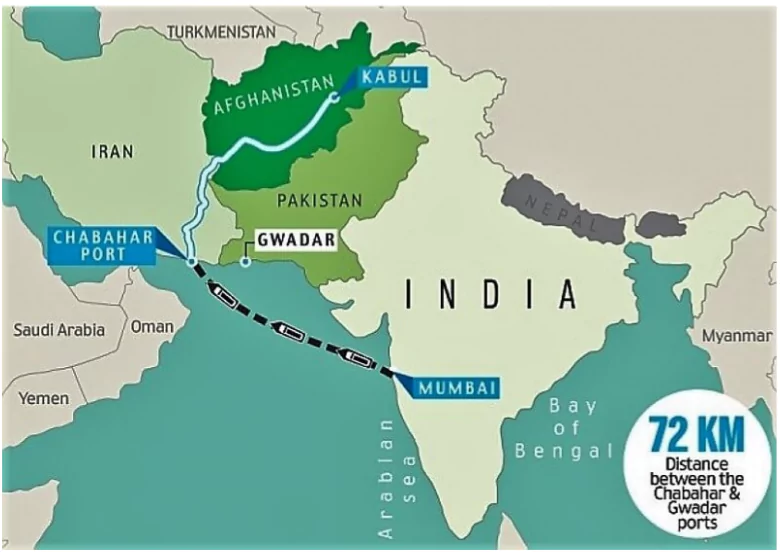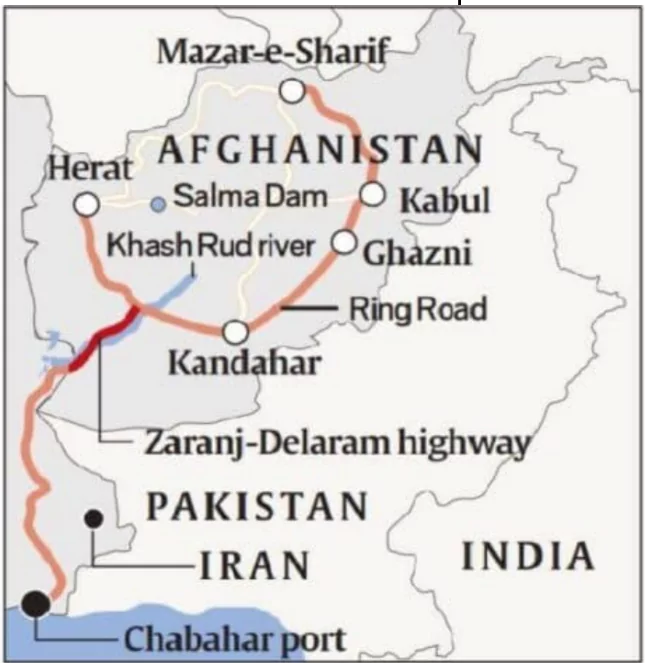Recently, the Indian Foreign Secretary met with the Taliban’s acting foreign minister Amir Khan Muttaqi in Dubai.
This meeting represents India’s highest-level engagement with the Taliban since their return to power in August 2021.
Recent Shifts in India’s Engagement with the Taliban

- Pragmatic Approach: India has moved towards a pragmatic engagement with the Taliban, despite not granting formal recognition to their regime. The focus has shifted from isolation to security concerns, trade, and humanitarian assistance.
- The Taliban’s requests for India to restart development projects and provide material support in areas such as healthcare and refugee rehabilitation were discussed.
- Humanitarian Assistance: India agreed to expand its involvement in humanitarian efforts, including further support to Afghanistan’s health sector and efforts to rehabilitate refugees.
- India has already provided significant aid, such as 50,000 MT of wheat, 300 tons of medicines, and vaccines.
- Trade and Connectivity: A key focus of the discussions was on promoting the use of the Chabahar Port as a key gateway for trade and commercial activities, bypassing Pakistan’s ports.
- India’s support for Afghanistan’s trade and the expansion of connectivity via Chabahar port is essential for bolstering Afghanistan’s economic ties with India and the region.
- Security Concerns: India’s main security concern remains ensuring that Afghanistan’s soil is not used for anti-India activities by militant groups like LeT, JeM, and ISKP.
- The Taliban’s assurances to India on security guarantees for Indian interests and facilities in Afghanistan were discussed, addressing some of India’s primary security fears.
- Strained Relations with Pakistan: The Pakistan-Taliban relationship has become increasingly strained, particularly with Pakistan’s airstrikes on Afghan soil, which India condemned in January 2025.
- The Taliban’s growing discomfort with Pakistan offers India an opportunity to strengthen its position in Afghanistan by engaging with the Taliban.
- Strategic Autonomy for the Taliban: The Taliban has expressed its desire to demonstrate strategic autonomy and reduce its dependency on Pakistan, signaling a shift in its foreign policy.
- The Taliban has shown interest in strengthening ties with India as part of its balanced and economy-centric foreign policy, viewing India as a key regional partner.
- Continued Engagement Despite Human Rights Concerns: Despite the Taliban’s oppressive policies, especially regarding women’s rights, India has continued its engagement, focusing on developmental cooperation and humanitarian aid.
- India has reiterated that it will not recognize the Taliban regime formally but will engage based on its national security interests and humanitarian commitments.
Enroll now for UPSC Online Course
India-Afghanistan Relations: Historical Perspective
Ancient Period
- Indus Valley Civilization: Historical ties trace back to the Indus Valley Civilization, where trade and cultural exchanges were prominent.
- Gandhara Region: Gandhara, part of modern-day Afghanistan, was one of the 16 Mahajanapadas in the Vedic Age. It was a hub for Buddhism, introduced by the Mauryan Empire.
- Bamiyan Buddhas: These majestic sculptures highlighted the influence of Buddhism in the region Period
- Cultural Exchange: Afghanistan served as a gateway for cultural exchanges and the spread of Islam into India.
- Political Integration: Several rulers of the Indian subcontinent, including the Mughals, had Afghan roots, further intertwining the two regions.
Colonial Era
- Anglo-Afghan Relations: Afghanistan’s strategic location led to several conflicts between British India and Afghanistan, including the Anglo-Afghan Wars (1839–1842, 1878–1880).
- Durand Line: Established in 1893 by the British, this boundary caused long-term disputes and instability in the region .
- Afghanistan has never officially recognized the Durand Line as the border between Afghanistan and Pakistan.
Post-Independance
- Treaty of Friendship (1950): India and Afghanistan established formal diplomatic relations, emphasizing mutual respect and sovereignty .
- Afghanistan’s Neutrality: Participation in the Asian Relations Conference (1947) emphasized its commitment to neutrality and friendly relations with India .
- Soviet-Afghan Relations (1979-1989): India sup Soviet-backed Afghan government during the Cold War, the only South Asian country to do so.
Modern Era
- Taliban Era (1996–2001): Relations soured during the Taliban regime, marked by incidents like the Kandahar hijacking (1999).
- Post-Taliban (2001): India played a key role in Afghanistan’s reconstruction after the Taliban’s fall, committing over $3 billion for infrastructure and capacity building projects.
- Landmarks:
- Salma Dam (Afghan-India Friendship Dam): Completed in 2016.
- Zaranj-Delaram Highway: Facilitated trade with Iran via Chabahar Port.
|
Reasons Behind India’s Decision to Engage Afghanistan
- Strained Pakistan-Taliban Relations: The once-close alliance between Pakistan and the Taliban has deteriorated due to increasing tensions.
- Taliban’s support for Tehrik-e-Taliban Pakistan (TTP) and Pakistan’s airstrikes on Afghan territory have caused friction.
- This provides India an opportunity to step in and counter Pakistan’s influence in Afghanistan.
- China’s Growing Influence: China has deepened ties with the Taliban, including exchanging ambassadors and launching urban development projects.
- Beijing’s investments in Afghanistan’s natural resources under the Belt and Road Initiative (BRI) threaten India’s regional interests, prompting Delhi to act to protect its influence.
- US Policy Changes and Trump’s Return: The return of Donald Trump to the White House may see renewed US-Taliban engagement.
- India aims to secure its interests in Afghanistan ahead of possible American re-engagement with the Taliban.
- Regional Security and Counterterrorism: A stable Afghanistan is critical to ensuring that terrorist groups like Lashkar-e-Taiba (LeT) and Jaish-e-Mohammed (JeM) do not use its territory for anti-India activities.
- Economic Opportunities: Afghanistan’s untapped mineral wealth, including copper, iron, lithium, and rare earth elements, presents economic opportunities for India.
- India has already invested $3 billion in infrastructure projects such as the Salma Dam and Afghan Parliament, which enhance Afghanistan’s economic growth and goodwill towards India.
- Weakened Iran: Iran is preoccupied with domestic stability and tensions with Israel after attacks on its proxies (Hezbollah, Hamas) and missile strikes.
- Iran’s reduced focus on Afghanistan creates space for India to enhance its role in the region.
- Russia’s Strategic Shift: Caught up in the Ukraine war, Russia seeks alliances with groups like the Taliban to counter threats from Islamic extremist groups in Central Asia.
- Moscow’s willingness to normalize relations with the Taliban highlights changing geopolitical equations, prompting India to engage proactively.
- Strategic Location: Afghanistan acts as a gateway to Central Asia, providing India access to energy-rich markets and bypassing Pakistan through the Chabahar Port in Iran.
- Projects like the Zaranj-Delaram Highway, built by India, facilitate trade and connectivity between India, Afghanistan, and Central Asia.
- Cultural and Historical Ties: Afghanistan and India share deep civilizational links, from the Indus Valley Civilization to the spread of Buddhism through the region.
- India’s provision of scholarships and cultural exchanges strengthens people-to-people ties, with thousands of Afghan students studying in India each year.
Implications of India Engaging with the Taliban
Positive Implications
- Regional Stability: Engagement with the Taliban provides India an opportunity to influence regional stability by countering terrorism and preventing Afghanistan from becoming a hub for anti-India activities.
- It strengthens India’s presence in Afghanistan, balancing China’s growing influence and Pakistan’s strategic goals.
- Look West Policy: Afghanistan could play a pivotal role in India’s westward geopolitical strategy.
- Preservation of Investments: By engaging with the Taliban, India safeguards its $3 billion worth of investments in Afghanistan, including critical infrastructure projects like the Salma Dam, Zaranj-Delaram Highway, and the Afghan Parliament.
- Resumption of stalled development projects ensures India’s continued goodwill among the Afghan population.
- Improved Trade and Connectivity: Leveraging Chabahar Port ensures uninterrupted trade routes to Afghanistan and Central Asia, bypassing Pakistan.
- Strengthening trade relations boosts economic activity in the region and opens new markets for Indian exports.
- Counter-Terrorism Collaboration: Dialogue with the Taliban helps ensure that groups like Lashkar-e-Taiba (LeT) and Jaish-e-Mohammed (JeM) do not operate from Afghan soil.
- Taliban’s assurances against the Islamic State-Khorasan Province (ISKP) align with India’s security concerns.
- Humanitarian Diplomacy: Providing humanitarian aid like wheat, vaccines, and medicines enhances India’s image as a responsible global power.
- Strengthening ties with Afghan civil society fosters people-to-people relationships.
Check Out UPSC CSE Books From PW Store
Negative Implications
- Legitimizing the Taliban Regime: Engaging with the Taliban without formal recognition risks indirectly legitimizing a regime known for its repressive policies, particularly towards women and minorities.
- This could lead to criticism domestically and internationally, challenging India’s democratic values.
- Security Risks: Despite Taliban assurances, there remains a risk of terrorist groups using Afghanistan as a base for cross-border terrorism targeting India.
- A deteriorating security situation in Afghanistan may spill over into South Asia, affecting regional peace.
- Strained Relations with Western Allies: Closer ties with the Taliban might not align with the policies of Western countries, particularly those critical of Taliban human rights violations.
- It could impact India’s partnerships with countries prioritizing democratic governance in Afghanistan.
- Complex Relations with Pakistan: While Pakistan-Taliban relations are strained, India’s engagement might provoke a backlash from Islamabad, potentially escalating tensions.
- Pakistan may use this as a pretext to increase proxy activities against Indian interests in Afghanistan.
- Unpredictable Taliban Policies: The Taliban’s internal divisions and lack of a cohesive governance structure make them an unreliable partner.
- Shifting allegiances and policies could jeopardize India’s investments and long-term strategic interests.
India’s Initiatives and Projects in Afghanistan

Infrastructure Development
- Salma Dam (Afghan-India Friendship Dam): Completed in 2016, this hydroelectric and irrigation project in Herat Province highlights India’s support for Afghanistan’s energy and agriculture sectors.
- Zaranj-Delaram Highway: Built in 2009, the 218 km road connects Afghanistan to Iran’s Chabahar Port, facilitating trade and bypassing Pakistan.
- Constructed by India’s Border Roads Organization.
- Afghan Parliament Building: Inaugurated in 2015, this landmark project cost ₹970 crore and stands as a symbol of India’s commitment to Afghan democracy.
- Shahtoot Dam Project: Announced in 2021, this dam is planned to provide drinking water to Kabul and support irrigation for nearby regions.
Community Development Projects
- High-Impact Community Development Projects (HICDP): Since 2005, India has implemented over 400 projects in all 34 provinces, focusing on education, healthcare, agriculture, and water management.
- Example: Construction of schools, healthcare centers, and water supply systems.
Trade and Connectivity
- Chabahar Port: Operationalized in 2017, it facilitates Afghanistan’s access to international markets and India’s trade with Central Asia, bypassing Pakistan.
- Air Freight Corridor: Launched in 2017, this corridor enables the export of Afghan goods like dry fruits, carpets, and medicinal plants to India.
Educational and Capacity-Building Programs
- Scholarships for Afghan Students: Since 2005, India has offered 1,000 ICCR scholarships annually to Afghan students.
- By 2023, thousands of Afghan students have graduated from Indian universities.
- Technical Training: India provides Indian Technical and Economic Cooperation (ITEC) training slots for Afghan professionals, focusing on governance and administration.
- Supported the establishment of the Afghan National Agricultural Sciences and Technology University (ANASTU) in 2014.
Health and Humanitarian Assistance
- Medical Aid: India established a Medical Diagnostic Center in Kabul in 2015.
- Provided COVID-19 vaccines, polio vaccines, and medicines, along with 50,000 MT of wheat for food security during the pandemic in 2020-2021.
- Food Security and Nutrition: Since 2002, India has supported the UN World Food Programme, delivering high-protein biscuits to Afghan schoolchildren.
Defense and Security Cooperation
- Military Equipment: India gifted Mi-25 attack helicopters to the Afghan Air Force in 2015-2016 to bolster their defense capabilities.
- Training Afghan Security Forces: Since 2011, India has trained Afghan National Defense and Security Forces (ANDSF) personnel at institutions like the National Defence Academy (NDA) and the Indian Military Academy (IMA).
|
Check Out UPSC NCERT Textbooks From PW Store
Challenges in India-Afghanistan Relations:
- Security Concerns: Afghanistan’s unstable political environment has allowed terrorist groups like Lashkar-e-Taiba (LeT), Jaish-e-Mohammed (JeM), and Islamic State-Khorasan Province (ISKP) to operate, posing threats to India’s national security.
- The Kandahar hijacking (1999) and attacks on Indian assets in Afghanistan underscore the security risks posed by extremist groups.
- Influence of Pakistan: Pakistan uses Afghanistan as a tool for strategic depth and supports groups hostile to India, such as the Haqqani Network, complicating India’s engagement.
- Pakistan’s ties with the Taliban and its alleged role in supporting terrorism have created an environment unfavorable for India’s strategic goals in the region.
- Taliban’s Internal Policies: The Taliban’s lack of commitment to an inclusive government and human rights violations, especially against women and minorities, make it challenging for India to justify diplomatic engagement.
- India has consistently advocated for an Afghan-led, Afghan-owned peace process, which contrasts with the Taliban’s exclusionary governance.
- Regional Rivalries and External Influences: Countries like China, Russia, and Iran have increased their influence in Afghanistan, potentially sidelining India’s strategic and economic interests.
- China’s involvement in Afghanistan’s natural resource projects under its Belt and Road Initiative (BRI) threatens to undermine India’s economic engagement in the region.
- Connectivity and Trade Barriers: Geographical constraints and Pakistan’s refusal to allow transit trade to Afghanistan have hindered India’s access to Afghan markets.
- The reliance on Chabahar Port and the Zaranj-Delaram Highway for trade underscores the difficulties India faces in establishing reliable and cost-effective connectivity.
Way Forward for India-Afghanistan Relations
- Maintain Pragmatic Engagement with the Taliban: Continue engaging the Taliban at the diplomatic and functional level to safeguard India’s strategic interests while avoiding formal recognition of the regime.
- Focus on ensuring Afghan soil is not used for anti-India activities, such as harboring terrorist groups like LeT, JeM, and ISKP.
- Enhance Humanitarian Assistance: Expand aid efforts in healthcare, education, and food security to strengthen people-to-people ties and foster goodwill.
- Focus on high-impact, community-oriented projects such as schools, hospitals, and clean water systems.
- Strengthen Regional Partnerships: Collaborate with countries like Iran, Russia, and Central Asian nations to stabilize Afghanistan and counterbalance China’s growing influence in the region.
- Leverage platforms like SAARC and SCO for coordinated action on trade and security.
- Secure Investments and Connectivity: Safeguard India’s $3 billion investments in Afghan infrastructure, including the Salma Dam, Zaranj-Delaram Highway, and other projects.
- Promote the use of Chabahar Port to bolster Afghanistan’s trade access and India’s connectivity to Central Asia.
- Support Inclusive Governance and Human Rights: Advocate for the formation of an inclusive government that respects women’s rights and minority protections, while cautiously engaging with the Taliban on these issues.
- Collaborate with Afghan civil society to build long-term institutional and social frameworks.
- Focus on Counter-Terrorism Cooperation: Work closely with regional powers to prevent the resurgence of terrorism in Afghanistan.
- Share intelligence and strengthen the Afghan security apparatus to counter extremist groups and protect India’s national security.
Enroll now for UPSC Online Classes
Conclusion
The Taliban’s permanence in Afghanistan’s governance necessitates pragmatic engagement. India should expand its humanitarian, economic, and diplomatic outreach under its Act West policy while carefully navigating regional and global challenges.
![]() 11 Jan 2025
11 Jan 2025


